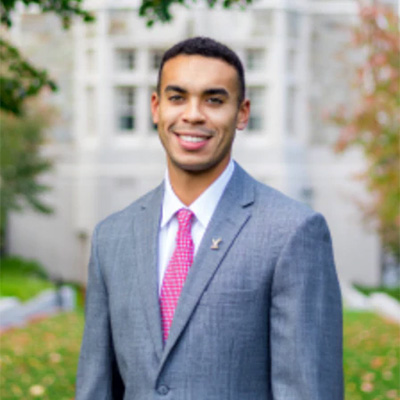After a semester of research and analysis, the 24 students in Goizueta Business School’s Venture Capital and Minority Entrepreneurship class announced the first three investments for the Peachtree Minority Venture Fund (PMVF). This student-run venture fund is the first of its kind to make equity investments for U.S.-based and underrepresented Black, Latinx and Indigenous entrepreneurs.
An integral part of The Roberto C. Goizueta Center for Entrepreneurship & Innovation, the $1 million fund recently announced its first round of capital opportunities.
Funding unique ventures
Chloë Cheyenne, founder and CEO of CommunityX
“When our team found out that we were going to be a part of the Peachtree Minority Venture Fund portfolio, we were very excited for all the obvious reasons,” says founder and CEO Chloë Cheyenne, who describes herself as a multiracial young woman with Chicago, Illinois, roots. “Hearing firsthand from all of the Goizueta staff, students and founders about how much thought and intention went into building this fund, we are totally humbled to be a part of this community.”
Ecotone Renewables of Pittsburgh, Pennsylvania, earned a $15,000 award and is the maker of Soil Sauce, a liquid plant fertilizer organically produced from food waste. By making sustainable food and agriculture systems more accessible and prevalent outside the industrial scale, Ecotone is dedicated to building the tools necessary to empower communities to redevelop and grow through sustainable food practices.
“We produce renewable energy through the extraction of biomass, as well as an organic, sustainable fertilizer,” said Ecotone Renewables CFO Elliott Bennett. “That fertilizer is our main focus as we look to empower communities. This is part of a sustainable form of agriculture because it allows new plants to grow. And really, it gives people the ability to be sustainable in the way that they plant, whether it’s on a farm or the garden.”
Bobby Gilbert, CEO and co-founder of FundStory 
“I’m really appreciative for the opportunity and the commitment, and we’re excited,” FundStory CEO and co-founder Bobby Gilbert says. “We like to think of it as the operating system for not a lot of capital. Entrepreneurs don’t wake up and decide they’re going to go into debt. Prior to funding through us, they have to map out a plan, choose the right partner and manage financing into maturity. We set out to build a FundStory with a thesis of helping founders for each stage of their journey.”
Reflecting on key takeaways
The three entrepreneurs spoke at a reception for Goizueta Business School alumni, faculty, administration, staff and the students who operated the fund as managing partners and associates. The reception was hosted by the five managing partners who operate the fund alongside teams of senior associates and analysts.
“We went through a lot of debate, and at the end of the day we made the most informed decisions we could,” says Humza Mirza, an MBA graduate and the fund’s managing partner for marketing and recruiting. “Did we get the right answer? Only time will tell. We are all taking a lot of learnings from getting the Peachtree Minority Venture Fund started.”
Elliott Bennett, CFO of Ecotone Renewables 
“Each of our teams worked tirelessly to make sure we have a strong pipeline going forward,” says Jack Semrau, an Evening MBA student and the fund’s managing partner for deal sourcing and portfolio management.
“We worked through a very traditional process of what you see in other VC firms, to make sure that we find exceptional founders who showcased their know-how and their specific industry and product so that we could proceed to actually make an investment,” Semrau continues. “We couldn’t be happier to make the first round of investments that are part of the Peachtree Minority Venture Fund.”
The fund grew from the work of Goizueta alumni who learned from local underrepresented entrepreneurs that access to capital was a major pain point and wanted to do something about it.
But “As students, you can only do so much; you have to have a faculty or staff member that really believes in the idea,” says Goizueta alumnus Willie Sullivan. He joined the current MBA students in thanking supporters “who really believed in this and believed in our ability to make this happen.”
One of those supporters is Robert Kazanjian, academic director of The Roberto C. Goizueta Center for Entrepreneurship & Innovation.
“We are really good at finding interesting ways to take what might be a straight theoretical issue in the classroom and then having students experience it in a real setting,” Kazanjian says. “This is a big challenge for professional schools, how to manage that tension between theory and practice. I see this venture fund as absolutely working and think this is a great example of what Goizueta does well.”

